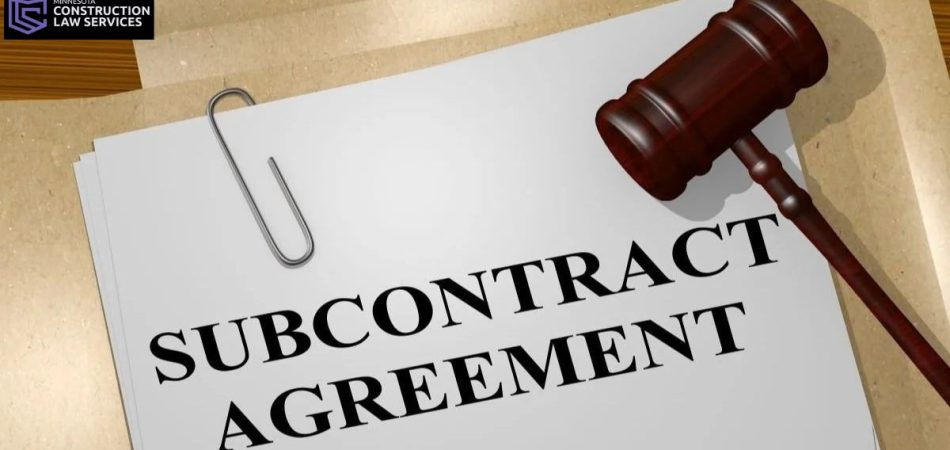Navigating subcontractor agreements in Minnesota residential projects is one of the most important steps contractors and developers can take to protect their business. They define working relationships so it’s clear who does what and when, how much gets paid, and who is responsible in the case of a disagreement. Solid subcontractor agreements are critical because poor contracts can lead to miscommunication issues and financial losses despite well-laid plans.
About Minnesota Construction Law Services
At Minnesota Construction Law Services (MNCLS), we handle residential construction law. We work with contractors, builders, developers, and design professionals to proactively use the law to protect their businesses.
Bill Gschwind, founder of MNCLS, has built and practiced law in the construction industry for years. He and his team know what you are up against, and we can take the stress off of you so that you can focus on building your business and enjoying the fruits of your labor.
Why Subcontractor Agreements Are Important
According to the U.S. Small Business Administration, Minnesota is home to over 547,000 small businesses with 1.2 million employees. Of these small businesses, 56,975 operate in construction-related industries, many needing to understand subcontractor agreements.
Rarely will a single contractor complete all phases of a residential construction project. General contractors typically subcontract with electricians, plumbers, roofers, and other specialty contractors to provide needed services on a project.
A subcontractor agreement is a written document that details these working relationships. Working without a subcontractor agreement creates potential for confusion regarding project timelines and costs, as well as the scope of work.
For instance, the general contractor may be held liable for the cost of repairs if a subcontractor completes work that is not in accordance with project specifications or is not completed on schedule. Having a clear subcontractor agreement reduces those dangers by establishing the following:
- The work parameters
- Schedules and terms for payments
- Precise standards for quality and efficiency
- Dispute resolution procedures
Robust contracts foster professionalism and trust on the job site in addition to providing businesses with legal protection.
Minnesota Subcontractor Agreement Laws
Certain laws are in place to help ensure that these agreements run smoothly and fairly. Some of these include:
- Stat. § 326B.805. This law requires licenses for roofers, remodelers, and contractors working on residential buildings. Subcontractor agreements may not be enforceable if all parties are not properly licensed.
- Minnesota Prompt Payment Act. This statute is related to the payment of subcontractors by contractors. It mandates that a prime contractor must pay a subcontractor within 10 days after receipt of payment by the contractor unless there is an agreement to the contrary. Interest may be charged on late payments.
Keeping current on these and other statutes helps contractors avoid all-too-common mistakes that cause many disputes or even legal claims. An experienced subcontractor agreement attorney can review contracts and make sure they are in compliance with state law.
Important Elements of a Subcontractor Agreement
A sound subcontractor agreement in Minnesota will generally contain several essential elements. Each of these plays a part in helping to avoid miscommunication and project complications. First, the subcontract must clearly define the scope of work. This outlines in detail what the subcontractor will do, including the work deadlines, materials to be used, and quality standards to be met. Vague language here can lead to costly disputes later.
Second, the payment terms must be unambiguous. Contractors need to clarify the payment amounts, schedule, and conditions that might lead to withheld payments, including situations of defective or incomplete work.
The agreement needs to have provisions covering both indemnification and insurance. The written clauses protect the involved parties against any liabilities resulting from mishaps that occur during work. Insurance requirements for subcontractors in Minnesota’s residential construction industry are especially important in this regard.
Finally, dispute resolution terms should be included. Early resolution of problems through mediation or arbitration can prevent costly and prolonged legal disputes.
Hire a Subcontractor Agreement Lawyer
Protecting your business is smart, and one of the most efficient ways to do that is to hire a subcontractor agreement lawyer. A qualified attorney can ensure that your agreements are enforceable under Minnesota law, tailored to your business needs, and designed to prevent future disputes.
Lawyers can help you avoid expensive errors by drafting your agreements and reviewing existing contracts while also guiding you through dispute resolution so that you can concentrate on developing residential projects.
FAQs
How Do I Structure a Subcontractor Agreement?
The first step in a subcontractor agreement should be to precisely outline the project schedule, terms of payment, and scope of work. The agreement should also cover state law regulations, insurance policies, and dispute resolution processes.
Confusion is reduced and enforceability is guaranteed when clear, comprehensive language is used. Effective contracts set standards for quality, performance, and accountability throughout the project while protecting the contractor and subcontractor.
Do Subcontractors Need a License in Minnesota?
Yes, subcontractors need a license in Minnesota. Minnesota law requires any person or business entity who performs or “subcontracts” for residential building or remodeling work to be a licensed contractor or remodeler, or qualify for an exemption.
The licensed individual must meet all state requirements for safety standards and consumer protection quality management. Minnesota courts may refuse to enforce contracts when an unlicensed subcontractor loses lien rights.
What Are the Three Types of Subcontracts?
The three types of subcontracts typically used are lump-sum, unit-price, and cost-plus. Lump-sum contracts specify a fixed price for the full project. Unit-price contracts pay based on the measurable quantities of work performed.
Cost-plus subcontracts provide payment to subcontractors based on their real expenses and an additional fixed fee or percentage. Selecting the proper structure requires consideration of relevant variables, including project size and complexity.
What Is the New Law for Subcontractors in Minnesota?
There are no recent laws for subcontractors in Minnesota, but updates to laws are made regularly. Minnesota has recently made updates to contractor licensing and consumer protection laws, increasing penalties for unlicensed work and clarifying the licensing requirements. This included increased enforcement of residential contractor licensing to hold residential contractors and subcontractors accountable for insurance, bonding, and disclosure requirements.
Contact MNCLS for Your Subcontractor Agreement Needs
If you have subcontractor agreement needs, MNCLS can help you. We can help you understand your legal rights and responsibilities and protect your interests. Contact us today to get started.






